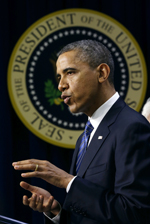WASHINGTON - President Barack Obama’s administration is leaning toward revising its proposal to regulate greenhouse-gas emissions from new power plants, according to several individuals briefed on the matter, a move that would delay tougher restrictions and anger many environmentalists.
The discussions center on the first-ever greenhouse-gas limits for power plants, which were proposed by the Environmental Protection Agency nearly a year ago. Rewriting the proposal would significantly postpone any action, and also might allow the agency to set more permissive standards for coal-fired power plants, which are about twice as polluting as those fueled by natural gas.
Any retreat on the rules would be a blow to environmental groups and their supporters, who constituted a crucial voting block for Obama and other Democrats in last year’s elections.
The move coincides with Obama’s call Friday for a new federal fund to research clean energy alternatives for cars and trucks. The creation of an Energy Security Trust, which the president outlined in his State of the Union speech, would invest $2 billion in federal revenue from oil and gas leasing into breakthrough technologies.
“After years of talking about it, we’re finally poised to take control of our energy future,” Obama said.
The contrast between the two policies highlights the delicate balancing act Obama is attempting to strike in his second-term energy and environmental agenda - seeking ways to combat climate change, while avoiding damage to a still-struggling economy.
Ross Eisenberg, vice president of energy and resources at the National Association of Manufacturers, said the options available to the administration to combat greenhouse-gas emissions “are not particularly good.”
Rep. Ed Whitfield, R-Ky., who chairs the Energy and Commerce Subcommittee on Energy and Power, was scathing in his assessment of the president’s approach to energy policy.
“It’s being set by fiat by this administration,” Whitfield said in an interview, adding that when it comes to curbing greenhouse-gas emissions from new power plants, “the consequences of this are gigantic. I don’t think the American public understand how gigantic they are.”
The Energy Security Trust would be just one component of the president’s broad “all-of-the-above” energy strategy, which includes supporting such alternative energies as wind, solar and geothermal sources, as well as increasing oil and gas development in the United States.
Obama, who noted that breakthrough research into advanced battery technology took place at Argonne National Laboratory, said new investments in clean energy research are critical to maintaining America’s competitive edge with countries such as China, Japan and Germany.
The administration anticipates the federal government will reap a growing amount of royalties in the coming years because of growth in oil and gas drilling. Obama said the Energy Security Trust would not add “a dime to our deficit.”
But congressional Republicans, whose support would be critical to establishing the trust fund, appeared skeptical of Obama’s proposal.
A spokesman for Alaska’s Sen. Lisa Murkowski, the ranking Republican on the Energy and Natural Resources Committee, said Obama “hit on a good idea” with the Energy Security Trust. But the spokesman, Robert Dillon, criticized the plan because it would divert shares of existing royalties and “would not enable new energy production to pay for it.”
The EPA proposal, which is due to be finalized April 13, would require any new power plant to emit no more than 1,000 pounds of carbon dioxide per megawatt hour of electricity produced.
Standards for new power plants are less contentious than imposing carbon limits on the existing plants, which emit 2.2 billion tons of carbon dioxide a year, or 40 percent of the nation’s carbon output. The Obama administration has yet to say if it will pursue that policy.
An administration official said the “EPA is still reviewing comments, and so any speculation to that extent would be premature.”
Front Section, Pages 5 on 03/17/2013

